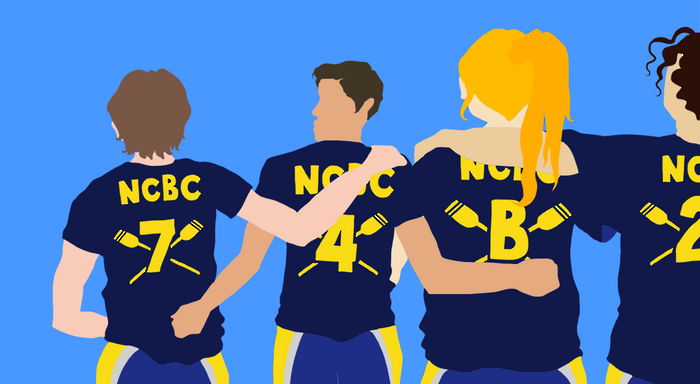Cambridge’s alternative curriculum: trying something new will make new things worth trying
In the second of a series of columns reflecting on life outside of the supervision room, Cait Findlay explores why leaving your comfort zone can often be a rewarding experience despite the risk

I’ve noticed that at the heart of the ‘Cambridge experience’ is a paradox whereby you’re expected to make the most of your time here by getting involved in as much as possible, while simultaneously being single-mindedly devoted, heart, soul, and the last vestiges of your sanity, to your degree. This is, evidently, impossible, and my friends here have been central to showing me that you don’t need to be busy all the time; even if that just means participating in the shared cultural enrichment of enjoying our favourite TV show together, some of which have been my favourite moments that I’ve spent here. It is acceptable to stop, sit down, and binge-watch Fleabag, or Queer Eye, or the entire ten seasons of Friends – Lent term of second year for me had a canned laugh-track running perpetually in the background. But perhaps more importantly, they’ve also showed me the opposite; that occasionally, dragging yourself out of your own comfort zone is as crucial as those moments of shared laziness.
You’ll either have a good time or a good story
It can, sometimes, be very difficult to drag yourself out of your room. You’re tired, or you’re stressed, or you’re just not sure that the effort to make yourself presentable and pleasant will be worth the fun you might have. It’s all too risky. The cost-benefit analysis does not seem particularly favourable.
What I’ve learned from my friends is that for those questionable social events, the attitude that works best to help you tie up your laces and head out the door is thinking that you’ll either have a good time or a good story. Either the hours will fly by, or you’ll have such an abominable evening that you’ll be able to chuckle about it the next day when you no longer want to eat tortilla chips in the bathtub for the foreseeable future (this is surprisingly enjoyable).
This also applies for trying new things – if you’re wondering whether it is worth the hassle of showing up somewhere to participate in something that you’re uncertain about at best and unenthusiastic about at worst, consider the potential for dramatic retellings of your trauma with your best friend. Blind Date veterans, you know what I’m talking about. If you didn’t bail or find a spouse, you almost certainly roasted your unsuspecting paramour behind their back the next day. They may well have done the same behind yours. That’s probably why hall is such a massive part of the Cambridge experience – laughing or cringing about your awkward attempts at flirtation over hash browns is the best way to deal with the times where you took a leap and didn’t quite land where you wanted to. Sometimes, you have to experience mild discomfort to see if any rewards are there for the reaping.
A subset of this lesson is learning that you are also allowed to leave. Bad date? Make up an early-morning commitment or exercise some brutal honesty. Terrible lecture? Walk out (unless you’re a scientist and your lectures actually matter – condolences). Too tired to stick around at an event? Leave. Is that essay deadline becoming more and more pressing? Take a break, step back, and come back to it later. It’s so liberating to realise that you can just get up and go if you’re not having a good time – and the walk home with a warming carton of chips is almost always the part of the evening that everyone looks forward to the most.
If I could go back to myself as a fresher, this is one of the main philosophies I would impart
In the spirit of ‘good-time-or-good-story’ I have: gone on countless dates (most of which have been the former, rather than the latter, thankfully); been unsuspectingly locked in Trinity on Halloween; attended many formals with people I barely knew; had truly awful evenings with pretentious English students who kept talking about how they were introduced to Gawain as a child; bought tickets for multiple student theatre productions; got up at 5:30am to attend an Easter service at dawn; the list could be endless.
Of course, this comes with a massive disclaimer: sometimes, not wanting to do something means precisely that you shouldn’t do it. You can be too tired, too stressed, too ambivalent. It’s important to learn where mild discomfort becomes extreme uneasiness – it’s part of working out where your boundaries lie. I could never have shown up to a meeting of the Tolkien Society or joined the Assassins Guild, for instance, let alone attempted Ultimate Frisbee or triathlon. All power to them and their capes, anxiety-inducing objectives, and extremely bizarre sports – but sometimes, the chance of a good story or a good time is too slim to make it worth the effort, especially if it involves putting on real clothes or exerting any energy.
If I could go back to myself as a fresher, this is one of the main philosophies I would impart. I often avoided events because I was too worried about feeling awkward or betraying any minor signs of discomfort – and yes, that’s a deeply tragic thing to admit. Through trial and error, and for better or worse, me and my friends all share the common principle that trying everything once, with low expectations and a sense of humour, is the best way to approach situations that may otherwise make you nervous to the point of not going.
So – where an event doesn’t, for whatever reason, inspire you with outright joy and enthusiasm, where there are no barriers in your way other than uncertainty, give it a try. You’ll either come out with a good time or a good story.
 News / Uni Scout and Guide Club affirms trans inclusion 12 December 2025
News / Uni Scout and Guide Club affirms trans inclusion 12 December 2025 News / Cambridge Vet School gets lifeline year to stay accredited28 November 2025
News / Cambridge Vet School gets lifeline year to stay accredited28 November 2025 Science / Did your ex trip on King’s Parade? The science behind the ‘ick’12 December 2025
Science / Did your ex trip on King’s Parade? The science behind the ‘ick’12 December 2025 News / Cambridge study finds students learn better with notes than AI13 December 2025
News / Cambridge study finds students learn better with notes than AI13 December 2025 News / Pembroke to convert listed office building into accom9 December 2025
News / Pembroke to convert listed office building into accom9 December 2025








